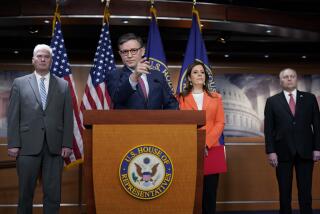Conferees OK Bill Assisting AIDS Patients
- Share via
WASHINGTON — House and Senate negotiators announced an agreement Wednesday on new AIDS legislation that for the first time would provide significant federal assistance for the clinical care of AIDS patients.
The Ryan White Comprehensive AIDS Resources Emergency Act of 1990, named after the late Indiana teen-ager who crusaded against AIDS discrimination after he contracted the disease through treatment for hemophilia, is expected to quickly pass the House and Senate. The House may vote on the bill as early as Friday.
The legislation authorizes the government to spend up to $875 million in the fiscal year that begins Oct. 1 on four new AIDS programs that would help states, cities and private health care facilities diagnose and treat those who have the disease.
In contrast, most of the $1.7 billion that the Bush Administration is seeking for AIDS spending in the next fiscal year would be set aside for research and education. The Ryan White measure would provide funding over and above the Administration request.
“Cities and states are struggling to keep their health systems from collapsing and they deserve federal aid,” said Sen. Edward M. Kennedy (D-Mass.), a member of the conference committee and co-author of the Senate version of the bill.
“This is the first time that the federal government is directing money toward the whole range of services that go along with the care that is going to be needed,” said Rep. Henry A. Waxman (D-Los Angeles), a member of the conference committee and author of the legislation passed by the House.
“The most significant issue for the future of this epidemic is treatment,” said Thomas B. Stoddard, executive director of the Lambda Legal Defense and Education Fund, the nation’s largest gay rights organization.
“Even the most promising developments in the laboratory will have no significance if our health care systems can’t deliver them to the people most in need,” Stoddard said. “This bill at least begins to address that problem.”
Both the House and Senate earlier had approved by wide margins different versions of the AIDS relief measure, despite Administration opposition. Waxman said he believes that President Bush will sign the legislation because of the overwhelming support it has received in Congress.
A White House official, who asked not to be identified, agreed that a veto is unlikely. However, the official said that Congress will be hard pressed to find all the money needed to pay for the programs authorized by the Ryan White legislation.
The “disaster relief” portion of the bill would provide up to $275 million in aid to those cities that have been hardest hit by the 10-year AIDS epidemic. As of June 30, more than 139,760 Americans had developed AIDS, and 85,430 had died.
To qualify for federal aid, a community would have to be in a metropolitan area with more than 2,000 reported cases of AIDS, or an incidence of at least 25 AIDS cases per 10,000 people. West Coast cities that would be expected to receive grants under the program are Los Angeles, San Francisco and San Diego.
A second program would authorize another $275 million in grants to states, using a formula based on the number of reported cases over the previous two years.
In addition, $305 million would be set aside for grants to states or private clinics to provide early intervention services, including testing for the human immunodeficiency virus that causes AIDS, patient counseling and prescription of drugs that have been shown to delay the onset of the disease.
The legislation also would authorize $20 million for a special research project to benefit children with AIDS.
More to Read
Get the L.A. Times Politics newsletter
Deeply reported insights into legislation, politics and policy from Sacramento, Washington and beyond. In your inbox twice per week.
You may occasionally receive promotional content from the Los Angeles Times.










